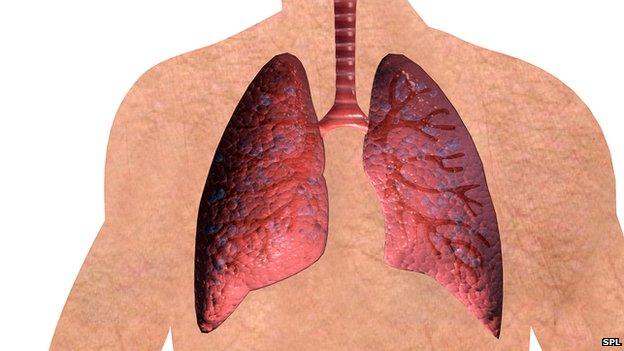Cancer survival rates 'continue to improve'
- Published

Prostate cancer survival rates are expected to improve for patients diagnosed in 2013
Most people diagnosed with cancer in England in recent years are surviving for longer, according to the latest statistics.
Eighty per cent of those with breast, prostate and skin cancer are living for five years after diagnosis. The figure is 90% for testicular cancer.
Recently diagnosed prostate cancer patients will see a large improvement in their hopes of survival.
The figures are published by the Office for National Statistics.
The ONS report, external estimated the chances of people surviving for one year and for five years after being diagnosed with cancer in England.
The report looked at survival rates for 24 different common cancers diagnosed between 2008 and 2013.
It found survival improving for the majority of cancers, with survival generally higher in women.
Survival boost
For people with cancers diagnosed in 2013, the greatest improvement in survival chances will be in men with prostate cancer - from 83.6% to 87.6%.
High survival rates for prostate cancer and breast cancer are thought to be due to the increasing number of men and women getting their cancer diagnosed and treated at an early stage.
Other lesser-known cancers also showed promising improvements in the chances of survival.
For women with myeloma, or cancer of the white blood cells, there was a rise in five-year survival from 41.6% for those diagnosed in 2007-2011 to 46.2% for diagnosis between 2008 and 2012.
There were also large increases in survival chances for men with myeloma and men with leukaemia.
While some cancers have a good prognosis, others "remain extremely poor", the ONS report says.
Five-year survival estimates for cancers of the brain, lung, liver, pancreas and stomach are all below 19% for men and 22% for women.
Pancreatic cancer for both men and women has a survival rate of just 5.4% - the lowest in both sexes.
'Greater awareness'
Nick Ormiston-Smith, head of statistical information at Cancer Research UK, said more people were surviving cancer then ever before "thanks to better treatments, earlier diagnosis and greater awareness".
"But the story's not so positive for all types of cancer," he said.
"Lung, pancreatic, oesophageal cancer and brain tumours still have relatively low survival rates, partly because they tend to be diagnosed at a later stage when they're much harder to treat."
He added: "We're working to beat all cancers sooner, increasing our research into cancers with lower survival rates and boosting our investment to help diagnose cancer earlier - accelerating progress to save more lives."
- Published4 April 2014

- Published19 June 2014

- Published12 July 2010